NCE2 lesson6 不定冠词
新概念英语第二册第六课6课课件
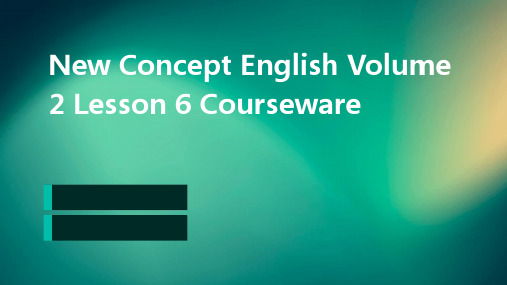
03
Lesson 5
Review and practice of all three tenses covered in this lesson.
05
02
Lesson 2
Introduction to the present simple tense and related vocabulary.
05 Interaction and discussion
Classroom interactive session
目的: 通过课堂互动,提高学 生的口语表达和听力理解能力 。
教师引导: 教师提出问题, 引导学生进行讨论。
实施方式
小组讨论: 学生分组讨论, 分享观点和意见。
Student questioning session
01 Course Introduction
Course objectives
Language knowledge
To help learners master basic English grammar and vocabulary, including present simple, present continuous, and past simple tenses.
Learning suggestions and prospects
Practice
Integration
Prospects
It is essential for students to practice the new vocabulary and grammar they have learned in this lesson through speaking and writing activities.
(完整版)青少版新概念2Aunit6知识点
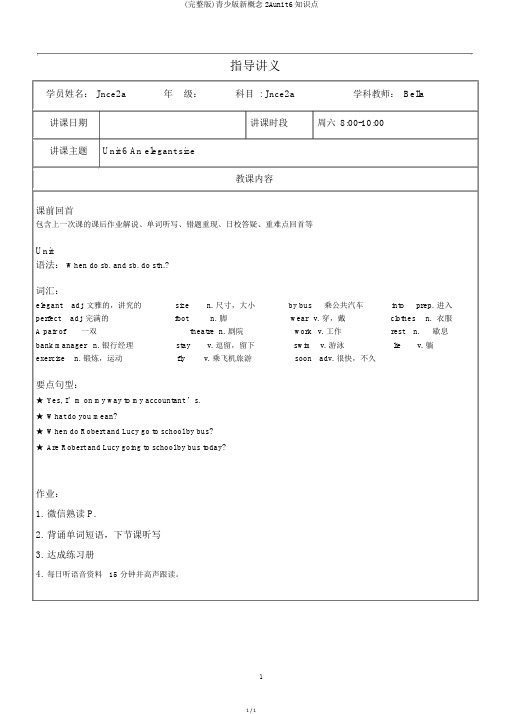
(完整版)青少版新概念2Aunit6知识点
指导讲义
学员姓名: Jnce2a年级:科目: Jnce2a学科教师:Bella 讲课日期讲课时段周六8:00-10:00
讲课主题Unit 6 An elegant size
教课内容
课前回首
包含上一次课的课后作业解说、单词听写、错题重现、日校答疑、重难点回首等
Unit
语法: When do sb. and sb. do sth.?
词汇:
elegant adj. 文雅的,讲究的size n. 尺寸,大小by bus 乘公共汽车into prep. 进入perfect adj. 完满的foot n. 脚wear v. 穿,戴clothes n. 衣服A pair of 一双theatre n. 剧院work v. 工作rest n. 歇息bank manager n. 银行经理stay v. 逗留,留下swim v. 游泳lie v. 躺exercise n. 锻炼,运动fly v. 乘飞机旅游soon adv. 很快,不久
要点句型:
★Yes, I’m on my way to my accountant ’s.
★What do you mean?
★When do Robert and Lucy go to school by bus?
★Are Robert and Lucy going to school by bus today?
作业:
1.微信熟读 P.
2.背诵单词短语,下节课听写
3.达成练习册
4.每日听语音资料 15 分钟并高声跟读。
1
1 / 1。
NCE2 Lesson 6

Lesson 6 单词讲解1. beggar n. 乞丐beg v. 乞求; 行乞 -arlie --- liar2. food n. 食物fast foodfrozen food junk foodgreen food3. pocket n. 衣服口袋jacket pocketpocket dictionarypocket moneyMoney burns a hole in his pocket.4. call v. 拜访,光顾I called at Mr. Green’s house yesterday. Ted will call on his professor tomorrow.I will call you back later.Someone called you up just now.Lesson 6 课文&语法讲解1. I have just moved to ...Who moved my cheese?He moved in last week.move out2. … a beggar knocked at my door.The bat knocked him on the head.3. He asked me for a meal …ask for 请求;向…要He asked Percy for help when he was in trouble.4. In return for this ...in return (for) 回报;作为报答I hope I can do something for you in return.In return for his help, I treated him to an ice cream.5. ... the beggar stood on his head…stand stood stoodHe can stand on his hands.stand on one’s own feet 独立;不依赖别人He had to stand on his own feet after graduation.6. …ate the food ... drank the beer. eat ate eatendrink drank drunk7. … put a piece of cheese in his pocket … put put putHe put the wallet in his bag.Then he put the bag in the drawer.8. … a neighbor told me about him. tell told toldtell sb about sthTina told me about her name.I read about his adventures.9. Everyone knows…Everybody is here. Nobody knows him. Everything is ready.10. He calls at every house …call at 拜访(某场所)I called at my neighbor’s house yesterday. call on 拜访(某人)We’ll call on our professor next Monday.Lesson 6 知识拓展(成人版)冠词在有些表示家居生活、社会事业机构的名词前,有或没有冠词的意义是不一样的。
新概念2第6课教案

Lesson 6 Percy ButtonsI have just moved to a house in Bridge Street. Yesterday a beggar knocked at my door. He asked me for a meal and a glass of beer. In return for this, the beggar stood on his head and sang songs. I gave him a meal. He ate the food and drank the beer. Then he put a piece of cheese in his pocket and went away. Later a neighbour told me about him. Everybody knows him. His name is Percy Buttons. He calls at every house in the street once a month and always asks for a meal and a glass of beer.Listening Practice.I have just _____ to a house in Bridge Street. Yesterday a beggar knocked at my door. He _____ me for a meal and a glass of beer. In return for this, the beggar stood on his head and sang songs. I gave him a meal. He ate the _____ and drank the beer. Then he put a piece of cheese in his pocket and went away. Later a neighbour told me about him. Everybody knows him. His _____ is Percy Buttons. He calls at every ______ in the street once a month and always asks for a meal and a glass of beer.Shadow PracticeWord PracticeFind out words you don ’t know.乞丐__________________衣服口袋_________________食物__________________ 拜访;光顾__________________Phrase Practice搬去某地___________________________敲门___________________________向某人要某物___________________________一顿饭___________________________一杯啤酒_________________________作为...的回报___________________________倒立___________________________唱歌_______________________给某人某物___________________________吃东西_______________________喝酒_______________________一块奶酪_______________________把...放进...里面_______________________走开_______________________告诉某人关于某事_______________________拜访某地_______________________一个月一次_______________________Sentence PracticeTranslate the sentences.昨天一个乞丐敲我的门。
新概念英语第二册第6课NCE 2 lesson 6
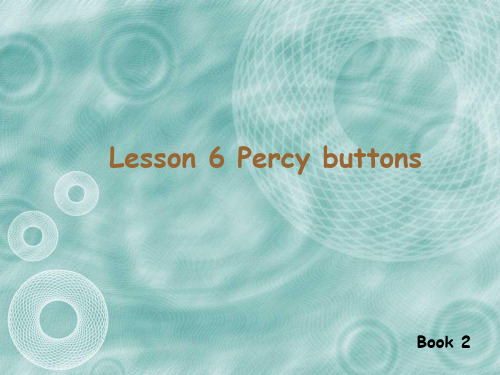
Book 2
惊鸿入世(精彩导入)
Listen to the music
/u24/v_NDM4MTg5MDk.html
traveler tourist tramp
beggar
They are beggars.
The famous beggar
food a lot of foods
call visit call at+地点=visit someplace
2
4
3
1
还记得他们 吗???
来认识庞大的call和pocket家族吧
call sb call up sb
1 1
call back 2
call on sb 3
call at+地点 4
1.给某人打电话 2.回某人电话 3.拜访某人 4.拜访某地 5.大声喊 6.招集和邀请某人 他们也有家 族啊啊啊 啊……
call out =shout 5
call in sb
6
inner pocket jacket pocket coat pocket pocket book
a.夹克的口袋 b.衣服口袋 c.内口袋 d.大衣口袋 e.袖珍词典 f.袖珍书
pocket dictionary
你能把他们送回家吗?
A. beggar B. call C. pocket
吃完喝,不忘拿,走了也快活。 邻里告,知他谁,吃喝……
针锋相对(口语比拼)
我刚刚转到了普陀区的一所学校。昨天一个新同学来敲我的门, 问我要英语作业。作为回报,这个男孩将它的游戏机借给我玩。 我他作业借给他。他用最快的速度抄完了。然后他又问我借了 数学笔记本带走了。后来,另一个同学告诉了我他的情况。 大家都知道他总抄英语作业。他的名字叫本•阿弗莱克。 他每天放学都去我们班的同学家, 总是要求借我们的英语作本业和数学笔记本。
新概念二 Lesson 6 Percy Buttons最全知识点总结

Lesson 6 Percy Buttons★Warm up1、(冠词)1.1 冠词分类1.2 冠词作用1.3 不定冠词的用法展示1.4、定冠词“节目预告”1.5、冠词的“隐形表演”1.6、定冠不定冠,意思差千万1.7、冠词的位置2、some与any的用法★Listening1、Who knocked at the author’s door yesterday?2、What did the beggar do in return for his meal and beer?3、How often does Percy Buttons call at every house in the street?★Vocabulary● beggar [ˈbeɡər] n. (可数) 乞丐【记忆】beggar = beg乞讨+ar人,物,器→beggar乞丐,穷人【拓展】beg v. 恳求; 乞讨; (狗)用后腿站立; 请求原谅;beggary n. 赤贫、乞食的习惯、卑鄙、卑劣【搭配】dull beggar 言语无味的人、头脑迟钝的家伙insolent beggar 傲慢无理的家伙little beggar 小家伙(指小孩, 小动物)lucky beggar 幸运儿, 走运的家伙beg for 乞求得到beg one’s pardon 请原谅、请某人再说一遍go begging 行乞、销路极差beg off 恳求免除(责任、责罚等)【例句】The old beggar was dirty and unkempt. 那个老乞丐蓬头垢面.● food [fu:d] n. (不可数) 食物【记忆】food 谐音“福德”→过去有食物吃就是福德【拓展】fruit 水果dessert 甜品beverage 饮料cooking method condiment 调味品drink 饮料vegetable 蔬菜【搭配】science food 科学食品junk food 垃圾食品fast food 快餐staple food 主食【例句】The shallow sea bed yields up an abundance of food. 浅海床提供了丰富的食物。
新概念英语第2册课程讲义Lesson6
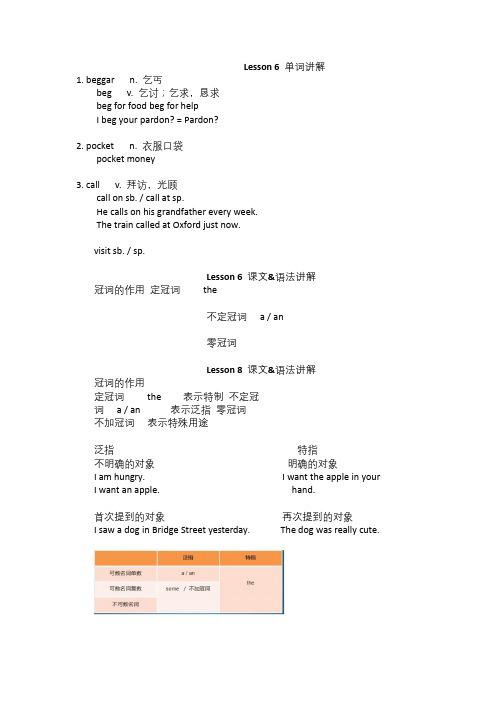
Lesson6单词讲解1.beggar n.乞丐beg v.乞讨;乞求,恳求beg for food beg for helpI beg your pardon?=Pardon?2.pocket n.衣服口袋pocket money3.call v.拜访,光顾call on sb./call at sp.He calls on his grandfather every week.The train called at Oxford just now.visit sb./sp.Lesson6课文&语法讲解冠词的作用定冠词the不定冠词a/an零冠词Lesson8课文&语法讲解冠词的作用定冠词the表示特制不定冠词a/an表示泛指零冠词不加冠词表示特殊用途泛指特指不明确的对象明确的对象I am hungry.I want the apple in yourI want an apple.hand.首次提到的对象再次提到的对象I saw a dog in Bridge Street yesterday.The dog was really cute.______air pollution is a serious problem.______air pollution of Beijing must be solved at once.Lisa gave me______tea as______gift.______tea tasted good.Last month I bought______CD.______CD is about the Civil War,and I found ______CD very interesting.I enjoy reading.Although______books are expensive,I always buy______ books in______bookstore in London Street.1.I have just moved to______house in Bridge Street.2.Yesterday______beggar knocked at my door.3.He asked me for______meal and______glass of beer.4.In return for this,______beggar stood on his head and sang songs.5.I gave him a meal.6.He ate______food and drank______beer.7.Then he put______piece of cheese in his pocket and went away.ter______neighbour told me about him.9.Everybody knows him.10.His name is Percy Buttons.11.He calls at every house in______street once a month and always asks for a meal and a glass of beer.Lesson6知识拓展本课重点:冠词a/an/the冠词As everyone knows,_______children require a lot of time and attention.A:Frank,where are_______children?B:Next door at the Jacksons’.冠词______water is essential to human life,but don’t drink______water in the Flat River.It’ll kill you!________pollution in that river is terrible.冠词Yesterday I saw_____dog and_____cat._____dog was chasing_____cat._____cat was chasing_____mouse._____mouse ran into_____hole,but_____hole was very small.冠词The mouse ran into a hole,but the hole was very small._____cat couldn’t get into_____hole,so it ran up_____tree. _____dog tried to climb_____tree,too,but it couldn’t.。
NCE2语法分布
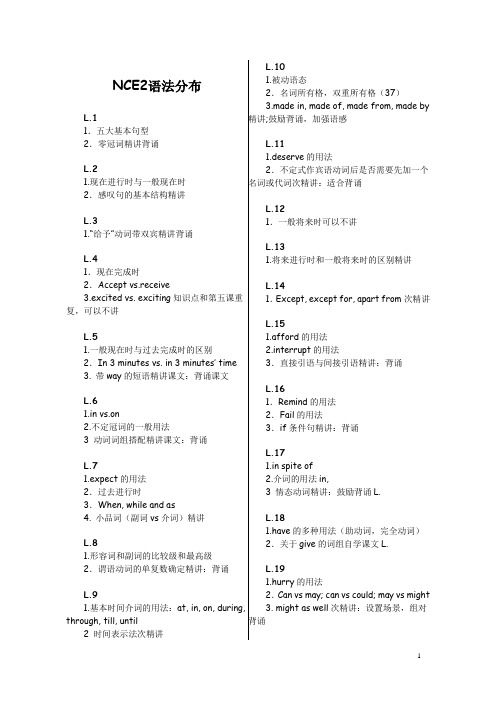
NCE2语法分布L.11.五大基本句型2.零冠词精讲背诵L.21.现在进行时与一般现在时2.感叹句的基本结构精讲L.31.“给予”动词带双宾精讲背诵L.41.现在完成时2.Accept vs.receive3.excited vs. exciting知识点和第五课重复,可以不讲L.51.一般现在时与过去完成时的区别2.In 3 minutes vs. in 3 minutes’ time3. 带way的短语精讲课文:背诵课文L.61.in vs.on2.不定冠词的一般用法3 动词词组搭配精讲课文:背诵L.71.expect的用法2.过去进行时3.When, while and as4. 小品词(副词vs介词)精讲L.81.形容词和副词的比较级和最高级2.谓语动词的单复数确定精讲:背诵L.91.基本时间介词的用法:at, in, on, during, through, till, until2 时间表示法次精讲L.101.被动语态2.名词所有格,双重所有格(37)3.made in, made of, made from, made by 精讲;鼓励背诵,加强语感L.111.deserve的用法2.不定式作宾语动词后是否需要先加一个名词或代词次精讲:适合背诵L.121.一般将来时可以不讲L.131.将来进行时和一般将来时的区别精讲L.141.Except, except for, apart from次精讲L.151.afford的用法2.interrupt的用法3.直接引语与间接引语精讲:背诵L.161.Remind的用法2.Fail的用法3.if条件句精讲:背诵L.171.in spite of2.介词的用法in,3 情态动词精讲:鼓励背诵L.L.181.have的多种用法(助动词,完全动词)2.关于give的词组自学课文L.L.191.hurry的用法2.Can vs may; can vs could; may vs might3. might as well次精讲:设置场景,组对背诵L.201.动名词充当主语和宾语2.Instead of vs. instead 精讲:背诵 L.211.含助动词的被动语态 2.Come into3.drive 的不同用法4.Home vs. house 次精讲 L.221 课后介词搭配练习文章次精讲 L.231.there is vs. it is 自学课文L.241 复习,主要是课后练习次精讲:鼓励背诵L.25 1 并列句选择or/either…or…/neither…nor…反意 but/yet 推论 so/thus 原因 for 精讲:背诵L.26 1.pretend 的用法 2.Appreciate 的用法 3.Hang 的用法4.哪些动词不适用于进行时次精讲:鼓励组对背诵 L.271.关于put 的词组2 and 引导的并列句次精讲L.281.现在完成时(现在完成时+since/ever since; 最高级句+现在完成时;have been to vs. have gone to )2 it is one of the ugliest faces I have ever seen 次精讲:现在完成时 L.291 called 初步引导定语从句省略2 the most surprising thing about it is that …表语从句精讲:背诵课文 L.301.towards 的用法 2.定冠词的用法3 there were some people doing sth.4 so…that…次精讲 L.31ed to do/be used to/get used to 2 过去完成时,过去进行时精讲课文:鼓励背诵,加强语感 L.321.形容词同级比较(as…as ),than usual 2 一段时间之后,发生另外一件事。
新概念英语NCE2_Lesson06课件

Percy Buttons
Questions
1. Who knocked the writer's door yesterday? 2. What did this man ask for? 3. What did he do to thank the wriPHRASES
Page 11
That's all !
1、书籍是朋友,虽然没有热情,但是非常忠实。2022年3月24日星期四2022/3/242022/3/242022/3/24 2、科学的灵感,决不是坐等可以等来的。如果说,科学上的发现有什么偶然的机遇的话,那么这种‘偶然的机遇’只能给那些学有素养的人,给那些善于独
过去了。 ④ 与off连用时有一些特殊含义,一般用于口语
vt. (价格上)减去,除去,打折扣 eg. They knocked five dollars off the price of the coat.
vi. 下班,停止,中断(工作等) eg. When do you usually knock off? 你一般什么时候下班
1. begger n. 乞丐;(口)家伙 eg. Let beggers match with beggers. (谚)
You lucky begger!
beg
v. 乞求,乞讨;恳求
beg sth. from sb. 从某人那里乞求
beg sb. (not) to do sth. 恳求做/不做某事
visit表示正式的访问,也可表示朋友间的拜访,时间可长可 短
eg. Yesterday, I paid him a visit.
see作为访问总是用于非正式的而且是熟人间的拜访
新概念英语NCE2_Lesson06(共40页)课件

boring
My occupation
dream
我的职业梦想
What do you want to be when you grow up?
I want to be …
Enjoy the story
1.Who’s Percy Buttons?
2. What did he want and what did he do to thank the writer?
a/an/the/some 7. call at / in / by / on 8. once a month
Yesterday – knock at – ask for – a meal – beer-- in return for this – stand on one’s head – sing songs – eat and drink – put – cheese – pocket – go away – call at – once a month – everybody – know – name
15. 借你一本书 16. 作出了一个重大决定 17. 在杭州的中心 18. 许多地方 句子: 19. 我哥哥待在澳大利亚有六个月了。
20. 昨天晚上我花费一个小时的时间才 写完了一封信。
1.spoil 2.public 3.friendly 4.waiter 5. whole 6.single 7.exciting 8.receive 9.firm / company 10.different 11.postcard 12.abroad 13.visit museums 14.teach me a few words of Italian 15.lend you a book 16.make a big decision 17.in the centre of Hangzhou 18.a great number of places 19.My brother has been in Australia for six
NCE2_Lesson_6_Percy_Buttons

骗术2租娃常见地:公园
• 这招有一定的难度,背后需要有组织配合和专 业的流程。首先,团伙负责人需到农村和落后 地区租娃。同时,在贫困的农村家庭,残疾儿 童被视为累赘,在听说能够有机会进城挣钱的 时候,家长们便同意以一定的价钱将残疾儿童 租给乞讨团伙。第二,此招一般出现在公园、 茶铺、农贸市场,乞讨者利用休闲或买菜人的 同情心以及厌恶来乞讨。
• • • • •
Pocket pocket money 零用钱 back pocket 后兜 coat pocket 衣袋 inner pocket:内口袋
Call
• • • • • • • •
call sb. 给某人打电话。 例句:I will call you. call on sb. 拜访(某人)。 例句:I will call on you. call at = call in 拜访,光顾(某人家)。 例句:I will call at/in your home. call by (at) 顺便光顾(某地)。 例句:I will call by at the shops on my way home.
Game
• • • • • • . stand on his head 倒立 stand on one„s hands 用手着地 stand on one„s knees 跪着
• • • • • •
lie on one's back 仰面躺着 lie on one's side 侧躺 lie on one's stomach 趴着
精讲课文
• 1. I have just moved to a house in Bridge Street. • 用法:move to 移动→搬家。 • 例句:My uncle‟s family will move to America next week.
新概念英语第二册第六课讲解

lesson 6 Percy Buttons一、生词和短语(词汇学习)词汇学习★knockknock at 敲(门窗等) ;knock at the door 敲门knock off: 下班,He knocked off earlier.knock sth off+ 地点:把某物从某处碰翻;knock the vase off the tableknock off: 打折,knock 10% off the price. 把价格降低10%。
knock over:打翻,碰翻 A car knocked the boy over. He knocked a glass over. 他把玻璃杯打翻了。
如果有地点,off; 无地点,over,I knocked the boy off the bicycle.knock out:淘汰;击败;出局;使不省人事;The thief stuned the police in the fight. 在搏斗中,小偷把警察打昏了。
★beggar n. 乞丐beg v. 乞求;I beg your pardon?ask for : 请求得到;beg for : 乞求得到★food n. 食物不可数; a lot of food★pocket n. 衣服口袋★call v. 拜访,光顾call sb: 给某人打电话;call up sb: 给某人打电话call back: 回某人电话;Can you tell him to call back?call on sb 拜访某人;I will call on you.call at+ 地点=visit someplace 拜访某地;I will call at your Home.call out =shout, 大声喊call in sb: 招集和邀请某人;For the project,the government called in a lot of experts.二、听力(回答问题)三、课文讲解(语法)四、课后习题【课文讲解】1 、I have just moved to a house in Bridge Street. 我刚刚搬进了大桥街的一所房子。
新概念二Lesson 6小测试答案

新概念二Lesson 6小测试答案一、按原文填空。
Lesson 6 Percy Buttons 珀西·巴顿斯I have just moved to a house in Bridge Street. Yesterday a beggar knocked at my door. He asked me for a meal and a glass of beer. In return for this, the beggar stood on his head and sang songs. I gave him a meal. He ate the food and drank the beer. Then he put a piece of cheese in his pocket and went away. Later a neighbor told me about him. Everybody knows him. His name is Percy Buttons. He calls at every house in the street once a month and always asks for a meal and a glass of beer.二、根据需要填上不定冠词或定冠词( a、the、some)。
Yesterday I bought ____ book. When I open it, I found out _____pages of _____ book were missing. I went back and asked for change. _____man was walking towards me.____ man smiled and said sorry to me. I was happy. If I want to buy____ book next time I will go to ______ Xinhua bookstore, because of their good service.三、给出下列不规则动词的过去式和过去分词1. read - ________ - ________2. come - _______ - ________3. meet - ________ - ________4. stand - ________ - _______5. forget - ________ - _______6. make - ________ - ________7. find - ________ - _______ 8. give - ________ - ______ _9. eat - ________ - _____ ___ 10. take - ________ - ________(三)My parents took me to Japan when I was little. I lived there for five years. 1 I cam e back, my Japanese was very good. “Can I do something useful with my Japanese?” I asked myself. Then, one day last spring, I got a good opportunity(机会). Everyone was afraid of SARS, so I stayed at home with 2 to do. My father brought me a Japanese b ook. “Why don’t you translate it into Chinese? It will be better than 3 computer games all day.” I promised(许诺) to do 2,000 words each day. But 4 I found it was hard to keep the promise. One day in May, the weather was beautiful. But I couldn’t go out. Those 2,000 words were still 5 me. After translating only three pages, I already lost interest in the book. I looked at it for a long time. But I couldn’t make myself turn the pages. How wished I could just go outside and 6 football with my friends! I counted the words again and again. I just wanted to give up. I felt as if two people were fighting 7 my mind. One said, “Don’t give up! Keep working hard, and you’ll do well!” But then the other one said, “Go and play! It will be mor e 8 than translating. Do your work tomorrow.” I stood up and would 9 the computer. But then I remember 10 my parents had told me: “Whatever you do, don’t stop halfway.” So I sat down and went on with it.( )1. A. Because B. Until C. Since D. When( )2. A. nothing B. something C. everything D. anything( )3. A. be played B. playing C. played D. plays( )4. A. just then B. right now C. soon D. suddenly( )5. A. talking to B. looking at C. smiling at D. waiting for( )6. A. play B. give C. buy D. watch( )7. A. in B. with C. about D. for( )8. A. fun B. important C. useful D. dangerous( )9. A. turn on B. turn off C. open D. close( )10. A. how B. where C. which D. what答案:1.D 2.A 3.B 4.A 5.D 6.A 7.A 8.A 9.B 10.D(一)A friend of mine was fond of drawing horse. He drew the horses very well,but he always began the tail. Now it is the Western rule to begin at the head of the horse, that is why I was surprised. It struck me that it could not really make any difference whether the artist begins at the head or the tail or the belly(肚子)or the foot of the horse, if he really knows his business. And most great artists who really know their business do not follow other people’s rule.They make their own rules. Every one of them does his work in a way peculiar(奇特的) to himself; and the peculiarity means only that he finds it more easyto work in that way.Now the very same thing is true to literature(文学). And the question, "How shall I begin?" only means that you want to begin at the head instead of beginning at the tail or somewhere else. That is, you are not yet experienced(有经验的) enough to trust to your own powers. When you become more experienced you willnever ask the question, and I think that you will often begin at the tail --that is to say, you will write the end of the story before you have even thought of the beginning.()1. A friend of the writer’s drew the horses ____.A. very wellB. in the way of western ruleC. in the way of his own ruleD. all of the above()2. The writer was surprised because ____.A. the artist began to draw at the head of the horseB. the artist began to draw at the tail of the horseC. the artist made his own ruleD. the artist did not follow other people’s rule()3. You are not yet experienced because ____.A. you don’t know where to beginB. you want to begin at the head instead of beginning at the tailC. you always asked questionD. you do not trust to your own powers()4. When you become more experienced you will ____.A. never ask questionB. often begin at the tailC. should write the end of the storyD. should think of the beginning()5. The topic of the passage is ______.A. How to draw a horseB. How to write a storyC. How to make your own rulesD. Trust to your own powers答案:CDDCD。
NCE2新概念二Lesson6课件共51张PPT[可修改版ppt]
![NCE2新概念二Lesson6课件共51张PPT[可修改版ppt]](https://img.taocdn.com/s3/m/4aa16f530b4c2e3f56276321.png)
food n.食物
f d
oo
foods 一类食物
Eg: sweet foods 甜食
I like all kinds of foods, vegetables, fruits.
Pocket(n.)
[ɔ]
Call (v.) [ɔ:]
1. Please call me when you get home.
A German can always speak more than two languages.
When should we use a/an?
3. 用于动词词组中
Eg:(疾病)
have a cold
have a headache
have a toothache
have a stomach ache
When should we use a/an? 1. 泛指“一个”,后接名 词单数。
I have a computer. a pen ……
What do you have?
When should we use a/an?
2. 用在表示职业、社会地位、宗教、 民族一类的名词前表示一类人。
Eg: An engineer’s job is very important in a tech company.
零冠词
1.在一日三餐、姓名、地名、国名 (非复合词)、西方节日前以及月份、 星期等前面。
零冠词
2.当bed, church, college, court, hospital, prison, school, sea, work 等n.指有关活动时。
Eg: go to school 去上学 go to the school 去学校(办公) ……
新概念二第6课课件

定冠词the
play the piano play the guitar play the violin
乐 西洋乐器前+the
定冠词the
the first
the Great Wall the USA、the UK
the Greens the +姓氏s
定冠词the
序 the first
the Great Wall the USA、the UK
不定冠词
Australian car
theatre
exciting trip conversation
不定冠词a/an
01
02
There is ________ u in “university”.
不定冠词a/an
01
02
There is ___a_____ u in “university”.
--Have you got ______ E-mail address?
--Oh yes, mine is wjb80@yahoo. com.
A. the
B. an
C. a
D. /
exercise
Lee Min-hao is______actor from South Korea. He sang ______ Chinese pop song on the 2014 CCTV New Year’s Gala. A. the; an B. /; the C. an; a D. a; /
定冠词the
in the north on the left in the south on the right in the west in the east
新概念2第6课练习题答案
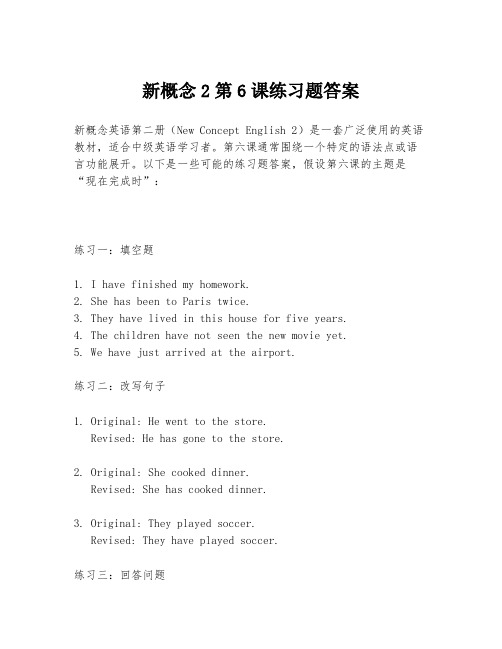
新概念2第6课练习题答案新概念英语第二册(New Concept English 2)是一套广泛使用的英语教材,适合中级英语学习者。
第六课通常围绕一个特定的语法点或语言功能展开。
以下是一些可能的练习题答案,假设第六课的主题是“现在完成时”:练习一:填空题1. I have finished my homework.2. She has been to Paris twice.3. They have lived in this house for five years.4. The children have not seen the new movie yet.5. We have just arrived at the airport.练习二:改写句子1. Original: He went to the store.Revised: He has gone to the store.2. Original: She cooked dinner.Revised: She has cooked dinner.3. Original: They played soccer.Revised: They have played soccer.练习三:回答问题1. Q: Have you ever been to New York?A: Yes, I have. I visited New York last year.2. Q: Has she read the book?A: No, she hasn't. She's planning to read it next week.3. Q: Have they finished their project?A: Yes, they have. They completed it yesterday.练习四:完形填空In the past few years, technology (1) has advanced rapidly. Many people (2) have started using smartphones, and the way we communicate (3) has changed significantly. However, despite these changes, some traditional methods of communication (4) have not disappeared completely.1. A. have advanced2. B. have started3. C. have changed4. D. have not disappeared练习五:写作Write a short paragraph about something you have done recently.Example:Recently, I have taken up a new hobby, which is painting. I have learned several techniques and have created a few piecesthat I am quite proud of. It has been a rewarding experience, and I have decided to continue developing my skills in this area.请注意,以上答案仅为示例,实际的练习题和答案可能会根据具体的教材内容而有所不同。
新概念英语NCE2_Lesson06(共37页)课件

Revision
5 Is that why he’s just bought some pigeons? Yes, it is.
6 How many has he bought? Twelve.
7 What happened yesterday? A pigeon carried the first message.
Percy Buttons I have just moved to a house in Bridge Street. Yesterday a beggar knocked at my door. He asked me for a meal and a glass of beer. In return for this, the beggar stood on his head and sang songs. I gave him a meal. He ate the food and drank the beer. Then he put a piece of cheese in his pocket and went away. Later a neighbour told me about him. Everybody knows him. His name is Percy Buttons. He calls at every house in the street once a month and always asks for a meal and a glass of beer.
New words
pocket n. 衣服口袋
inner pocket 内口袋; jacket pocket 夹克的口袋; coat pocket 大衣口袋 pocket book 袖珍书; pocket dictionary 袖珍词典 pocket pick 车上的小偷 pocket money (小孩的)零花钱
新概念英语第二册第6课重点语法句型

第6课的内容: ⼀、重要句型或语法 1、冠词的⽤法 1)不定冠词a/an,如:a pen, an egg 2)定冠词the,如:A dog is barking at me. The dog is black and white. 3)零冠词,即不⽤冠词的情况,如⼈名和地名前⾯,如:John lives in London. 2、短语动词的⽤法 短语动词指的是后⾯跟上介词或副词后、意思会发⽣变化的动词。
如: 1)I put your book on the shelf. / I put on my hat and left the house. 2)It was very hot, so I took off my coat. / Will you look after the children for me please? ⼆、课⽂主要语⾔点 I have just moved to a house in Bridge Street. 1)注意move to表⽰搬到什么地⽅,move into表⽰搬进什么地⽅。
2)注意地名Bridge Street⾥的每个单词的⾸字母都要⼤写。
Yesterday a beggar knocked at my door. 1)beggar来源于beg(请求,祈求),表乞丐。
2)knock at表⽰敲打。
He asked me for a meal and a glass of beer. ask sb. for sth.,表⽰向某⼈提出请求或要求。
注意ask sb.表⽰询问某⼈。
In return for this, the beggar stood on his head and sang songs. 1)in return for sth.,作为对...的回报。
2)stand on one's head,表⽰倒⽴。
He ate the food and drank the beer. 1)本句为由and连接的并列句,⽽且前后结构完全⼀样,使得整句话颇有节奏感。
新概念第二册第六课

当表示不确定的某个人或物 时,用不定冠词a/an(单数, 可数名词)
★Grammar
a glass of milk a bag of flour a bar of soap
当表示不可数的名词时,则需要 由不定冠词加量词组成词组
★Grammar
A tiger is a dangerous animal. Some salt is necessary for/to us all.
The boy asked (his parents)for money again/once more.
★Text & Key points
2.In return for this, the beggar stood on his
head and sang songs.
in return (for this) 作为(对……的)回报,作为交 换
★FOOD
N. 食物(不可数)
a lot of food
★pocket n. 衣服口袋
inner pocket 内口袋 coat pocket 大衣口袋 jacket pocket 夹克的口袋
★pocket n. 衣服口袋 pocket money (小孩的) 零花钱
change 零钱 beer money (男人的)零花钱
Some 可修饰可数名词的复数和 不可数名词。
★Grammar
a和the的区别: 1. a是泛指, a man; the是特指, the man
★Grammar
2.在文章当中第一次出现名词的时候往往用a 和an修饰, 第二次出现的时候用the(有时相 当于this/that/these/those),可数名词单/复 数或不可数名词均可。 A man is walking towards me. The man is carrying a parcel. The parcel is full of meat.
- 1、下载文档前请自行甄别文档内容的完整性,平台不提供额外的编辑、内容补充、找答案等附加服务。
- 2、"仅部分预览"的文档,不可在线预览部分如存在完整性等问题,可反馈申请退款(可完整预览的文档不适用该条件!)。
- 3、如文档侵犯您的权益,请联系客服反馈,我们会尽快为您处理(人工客服工作时间:9:00-18:30)。
You can dream IT,You can do IT
Lesson 6
(4)拜访;访问 He was out when I called to see him. 当我拜访看他时候,他不在家。 call on sb. 拜访某人 I will call on you next week. 我下周要去你家。 call at+地点=visit someplace 拜访某地 I will call at your home next week. 我下周要去你家。 The train calls at large stations only. 这列火车只停大站。
其他短语:
call for要求;需要 call in 召集
You can dream IT,You can do IT
Lesson 6
I have just moved to a house in Bridge Street. Yesterday a beggar knocked at my door. He asked me for a meal and a glass of beer.
Lesson 6
You can dream IT,You can do IT
Lesson 6
将下面三个句子翻译成英文。 1 进房间不敲门是很不礼貌的。 2 那个小孩在商场里向妈妈要玩具。 3 下周我想去拜访初中的老师。
You can dream IT,You can do IT
Lesson 6
stand on one's head 倒立 例句:Sometimes I feel dizzy after I stand on my head. 有时候倒立之后我会感到头晕。
You can dream IT,You can do IT
Lesson 6
Then he put a piece of cheese in his pocket and went away. Later a neighbour told me about him.
作为回报,那乞丐头顶地倒立起来,嘴里还唱着歌。 我给了他一顿饭。 他把食物吃完,又喝了酒。
You can dream IT,You can do IT
Lesson 6
in return for 作为(对某物)的付款或回报;酬谢 例句:He gave her some dessert in return for her kindness. 他送了她一些点心以答谢她的好意。 Can I buy you lunch in return for your help? I asked her opinion, but she just asked me a question in return.
(sb.) for sth =request for sth. 问某人要什么东西 (for 为了这个目的去请求某人, sb.更多的时候不 出现, 可以直接用ask for sth.) to ask for a job/a drink/an explanation I am writing to ask for some information about courses. The boy asked (his parents)for money again. He asks the newspapers for help. 他向那家报社寻求帮助。
Instructor: Cary
Lesson 6 Lesson6 Percy Buttons 珀西· 顿斯 巴
First listen and then answer the question. 听录音,然后回答以下问题。 Who is Percy Buttons? I have just moved to a house in Bridge Street. Yesterday a beggar knocked at my door. He asked me for a meal and a glass of beer. In return for this, the beggar stood on his head and sang songs. I gave him a meal. He ate the food and drank the beer. Then he put a piece of cheese in his pocket and went away. Later a neighbour told me about him. Everybody knows him. His name is Percy Buttons. He calls at every house in the street once a month and always asks for a meal and a glass of beer.
knock也可作名词,表示短促的敲或打 例句:I will give you a knock if you don't get up at 8 o'clock. 如果你八点钟还没起床我就来敲门。
You can dream IT,You can do IT
Lesson 6
He asked me for a meal and a glass of beer.
You can dream IT,You can do IT
Lesson 6
n. 食物
(1)指“食物、食品”的时候,通常为不可数名词。如: We are out of food. 我们食物吃完了。 We can't live without food and water. Good food keeps you healthy. 好的饮食使你健康。 (2)表示某种特殊种类的食物,则可用作可数名词。 There are all kinds of foods on the table. 桌子上摆放着各式 食物。 Don’t eat too many dairy foods. 不要吃太多的奶制品。
我刚刚搬进了大桥街的一所房子。 昨天一个乞丐来敲我的门。 问我要一顿饭和一杯啤酒。
You can dream IT,You can do IT
Lesson 6
knock [动词] 敲,打(某物)
例句:He knocked several times on the window. 他敲了几下 窗。
然后把一块乳酪装进衣袋里走了。 后来,一位邻居告诉了我他的情况。
You can dream IT,You can do IT
Lesson 6
Everybody knows him. His name is Percy Buttons. He calls at every house in the street once a month and always asks for a meal and a glass of beer.
ask
You can dream IT,You can do IT
Lesson 6
In return for this, the beggar stood on his head and sang songs. I gave him a meal. He ate the food and drank the beer.
You can dream IT,You can do IT
New Words & Pronunciations
v. 移动;搬家; 迁移;离开
Lesson 6
n. 啤酒
n. 乞丐ቤተ መጻሕፍቲ ባይዱ
v. 忍受;具有;支撑 n. 熊
n. 食物
n. 衣服口袋
v. 拜访,光顾
You can dream IT,You can do IT
Lesson 6
n. 乞丐 beggars sleeping on the street 露宿街头的乞丐
v. 乞讨;恳求;请求
俗语拓展 beggars can't be choosers 要饭的哪能挑肥拣瘦,没有选择权就只好满足于能得到的东西
I beg your pardon!请你再说一遍! They begged him for help. Forgive me, I beg you! She begged him not to leave. The children were begging for food.
You can dream IT,You can do IT
Lesson 6
短语扩展: knock off (sth.) 停止做某事(尤指工作);降价 knock sb. out 击倒对手 knock sb. /sth. over 撞倒某人 knock sb. up (敲门、窗等)叫醒某人
将下面三个句子翻译成英文。 1 进房间不敲门是很不礼貌的。 →It's very impolite to enter a room without knocking at the door. 2 那个小孩在商场里向妈妈要玩具。 →The kid is asking his mother for a toy in the shopping mall. 3 下周我想去拜访初中的老师。 →I want to call on my teacher of middle school next week.
You can dream IT,You can do IT
Lesson 6
